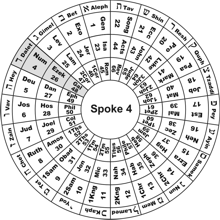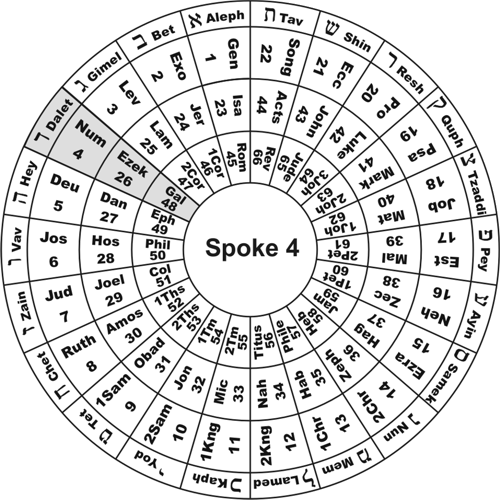Ezekiel: The Foursquare Prophetic Temple
So he measured the court, an hundred cubits long, and an hundred cubits broad, foursquare;
and the altar that was before the house.
Ezekiel 40:47 (Spoke 4, Cycle 2)
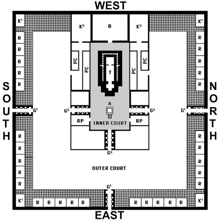 The
supernatural manifestation of the Number 4 on the Fourth Spoke continues unabated in the last nine chapters of
Ezekiel where almost everything about the prophetic Temple is foursquare. For example, the angel specifically
measured it from all four directions: The
supernatural manifestation of the Number 4 on the Fourth Spoke continues unabated in the last nine chapters of
Ezekiel where almost everything about the prophetic Temple is foursquare. For example, the angel specifically
measured it from all four directions:
42:16 He measured the east side, five hundred reeds
42:17 He measured the north side, five hundred reeds
42:18 He measured the south side, five hundred reeds
42:19 He turned about to the west side, and measured five hundred reeds
42:20 He measured it by the four sides ...
Both the Number 4 and the geometric figure of a square are also prominent in
the description of the
altar that lies at the exact center of the Temple, marked by an "A" in the diagram:
So the altar shall be four cubits high; and from the altar and upward shall be
four horns. And the altar shall be twelve cubits long, twelve broad, square in the four squares thereof.
Ezekiel 43:15f
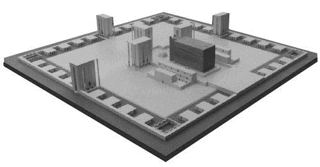
There is one striking variation from the fourfold pattern of the Temple; the four walls of both the
outer and inner courts each have only three gates! The three dimensional model,
provided by Paul Jablonowski  who has an excellent website analyzing the Temple, shows
the extreme prominence of the three pairs of gates. Each gate rises to a height of sixty cubits (102 feet)
which is fifty-four cubits (92 feet) higher than the walls! Obviously, God really wants us to take
special note of them. Indeed, He devoted a number of chapters detailing its every measurement and specifically
commanded Ezekiel to show it to the Jews so they could "measure it" (Ezek 43:10). And why?
Lamar Cooper, in his article on Ezekiel in the New American Commentary, suggested a profound theological significance
of the three gates: who has an excellent website analyzing the Temple, shows
the extreme prominence of the three pairs of gates. Each gate rises to a height of sixty cubits (102 feet)
which is fifty-four cubits (92 feet) higher than the walls! Obviously, God really wants us to take
special note of them. Indeed, He devoted a number of chapters detailing its every measurement and specifically
commanded Ezekiel to show it to the Jews so they could "measure it" (Ezek 43:10). And why?
Lamar Cooper, in his article on Ezekiel in the New American Commentary, suggested a profound theological significance
of the three gates:
The gates are a foreshadowing of the accessibility God gave to all people through Jesus,
who presents himself as the door [delet!] by which one can enter to God and be saved
(see John 10:9–21). The choice of three gates for this temple rather than four or more may suggest a
deeper significance of the means of access God provides for humans to approach him, since God manifests himself in
three ways to the human family as Father, Son, and Holy Spirit.
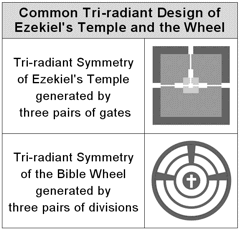
Cooper is correct. Similar logic led the ancient Christian iconographers to depict Christ with a tri-radiant cruciform halo.
This means we have a fourfold convergence of 1) ancient Christian art, 2) the pattern of Ezekiel's prophetic Temple,
3) the geometric structure of God's Word, and 4) the Doctrine of the Trinity! Yet there is more, so much more!
The three paired gates triangulate onto the foursquare altar of sacrifice –  –
at the exact center of Temple,
pointing to the central event of all Scripture, the crucifixion of Christ at Golgotha,
the axis of the Wheel (BW book pg 377).
Furthermore, the three pairs of gates and divisions follow the pattern of three pairs of days in the
Days of Creation of Genesis 1 (BW book pg 49)! –
at the exact center of Temple,
pointing to the central event of all Scripture, the crucifixion of Christ at Golgotha,
the axis of the Wheel (BW book pg 377).
Furthermore, the three pairs of gates and divisions follow the pattern of three pairs of days in the
Days of Creation of Genesis 1 (BW book pg 49)!
The original Temple in Exodus – the House (Bet) of God – represented His presence amongst His people.
It housed the Ten Commandments – the prototypical Word – in typological anticipation of the incarnation
of the Living Word, the Lord Jesus Christ. All of this was discussed at length on Spoke 2
where we saw that the ultimate meaning of Bet (House) is found in God the Son, the Word,
the Second Person. This is its full spiritual meaning, the true antitype of the Temple. It is an image
of the Triune God known through the Living Word, manifest here now in the Written Word, the Holy Bible!
Related article: The Prophecy of Ezekiel's Wheels
| 